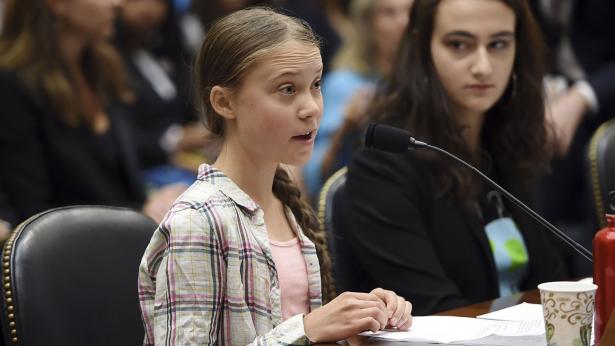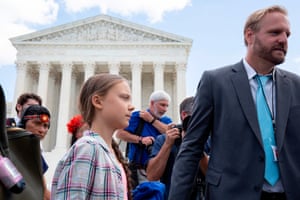The climate campaigner Greta Thunberg has bluntly told members of Congress to heed scientists’ warnings over global heating on a day when the existential anguish of young activists was given a voice at the heart of Washington DC power.
Thunberg, the Swedish teenager who has ignited a global youth climate movement, said at a congressional hearing that she had no prepared remarks other than to submit the landmark IPCC report, published last year, that warned of the rapidly approaching catastrophe of global heating.
“I don’t want you to listen to me, I want you to listen to the scientists,” Thunberg told the US lawmakers. “I want you to unite behind the science and I want you to take real action.”
‘Listen to the scientists,’ Greta Thunberg tells Congress – video
Thunberg told the joint House of Representatives committee that she was “furious” when she first learned of the climate crisis, adding that “it should be taken for granted” that climate science was accepted and acted upon.
The 16-year-old was given a largely respectful reception by US politicians who remain deeply split over the urgency, and even the veracity, of the climate crisis.
The hearing came on a day when Donald Trump’s administration, which has reversed the major climate policies put in place by Barack Obama, sought to hobble California’s ability to enact stricter emissions standards for cars and trucks.
The Republican members of the committee, however, praised the efforts of Thunberg and acknowledged the reality of climate change. “I agree we need to take aggressive action,” said Garret Graves, a Louisiana Republican known for a firmer embrace of climate science than many others in his party.
Graves did gently spar with Thunberg over his repeated assertion that China, the world’s largest emitter of greenhouse gases, should be the main target of activist ire. Thunberg, who arrived in the US in August on a solar-powered yacht, was asked by Graves what she would do if she saw another boat throw rubbish into the sea.
“I would tell [the] other boat to stop dumping trash in the ocean,” she said. She then told Graves: “I am from Sweden, a small country, and it’s the same argument: ‘Why should we do something? Look at the US.’ It’s being used against you as well.”
Members of Congress heard from other young climate activists who explained the trauma of growing up in a world primed for greater floods, storms, heatwaves and unrest because of rising global temperatures.
“This should fill you with shame. Youth climate activism should not exist,” said Jamie Margolin, a 17-year-old who told of choking wildfire smoke in recent summers in her native Washington state. Margolin said her fellow students suffer anxiety and a “weird form of nihilism” where they wonder if it’s worthwhile making future plans.
“There’s depression and fear,” she said. “It’s devastating and scary and also feels like we’ve been betrayed. It is shameful and cowardly to not take action. How can we call ourselves an example for the world if we are going to be cowards and not do anything?”
Bill Keating, a Massachusetts Democrat who chaired the hearing, said he was sorry that young people had to come to Washington DC to plead for greater action.
“Our generation has failed to adequately address our climate crisis,” he said. “This failure isn’t fatal, yet our failure to change will be. We wouldn’t be in this situation right now – our witnesses would be safely and happily in school pursuing their dreams and not protesting and pushing their governments to act – if everyone was already doing their part.”
At a news conference following the hearing, plaintiffs in a lawsuit that alleges the US government violated young people’s rights by abetting activities that have contributed to global warming, called for legal action to force greater movement on climate change from the US.
“We are very fortunate in this country that we have three branches of government so that when there are branches of government that are actively harming our children, and have done so knowingly over the last 50 years by creating an energy system based on fossil fuels, the courts can step in to protect the rights of our children,” said Andrea Rodgers, a staff attorney at Our Children’s Trust, which is representing the young people in the case.
The committee was the latest stop in a long series of events for Thunberg, who last year started to skip school every Friday in order to protest against inaction over the climate crisis. Her stance spawned a global strike movement that will escalate on Friday when adults, as well as students, will walk out of their workplaces over the emergency.
The protests come ahead of a UN climate summit in New York next week where governments will be urged to strengthen their efforts to cut emissions.
The world is currently on track to surpass a warming limit of 2C agreed to in the Paris climate agreement, with major emitters such as the US and Brazil now headed by leaders who have questioned climate science and enthusiastically back mining and logging that causes the release of planet-warming gases.
Greta Thunberg leaves after a gathering outside the US supreme court. Photograph: Alastair Pike/AFP/Getty Images
Greta Thunberg rounded off her two-day tour of Capitol Hill with a 15-minute address to around 150 people. The teenage activist looked a little nervous at first as she took the lectern under a giant chandelier in a grand committee room, but then smiled as she resumed her call to arms against the climate crisis.
“The USA is the biggest carbon polluter in history,” she told the audience. “It is also the world’s number one producer of oil. It is also the only nation to signal its intention to leave the Paris climate agreement because it was ‘a bad deal’.”
Speaking softly, she modulated her voice slightly to make clear she was quoting, disapprovingly, Donald Trump with the words “a bad deal”.
Thunberg invoked Martin Luther King’s struggle for civil rights and John F Kennedy’s goals that included landing a man on the moon – “not because they are easy, but because they are hard”, – to plead with Washington to lead in the fight, even if it seems impossible. “Giving up can never be an option,” she said.
The speech was greeted with a standing ovation and followed by a panel discussion. Thunberg, due to take a train to New York on Wednesday night, was asked about her observations of the way Washington works. She replied: “It’s definitely more calm than I thought. Everything is just happening so slow and people are just repeating the same things over and over again.
“I have heard so many politicians here say the same things over and over again. If it continues like that, we’re not going to get anywhere.”
She also had a message for those who feel depressed or paralysed by the scale of the crisis. “I started to do something, take action, try to make a difference instead of sitting in despair. That changed my life. It gives your life meaning... To know you can have impact, it makes you feel a lot better.”



Spread the word